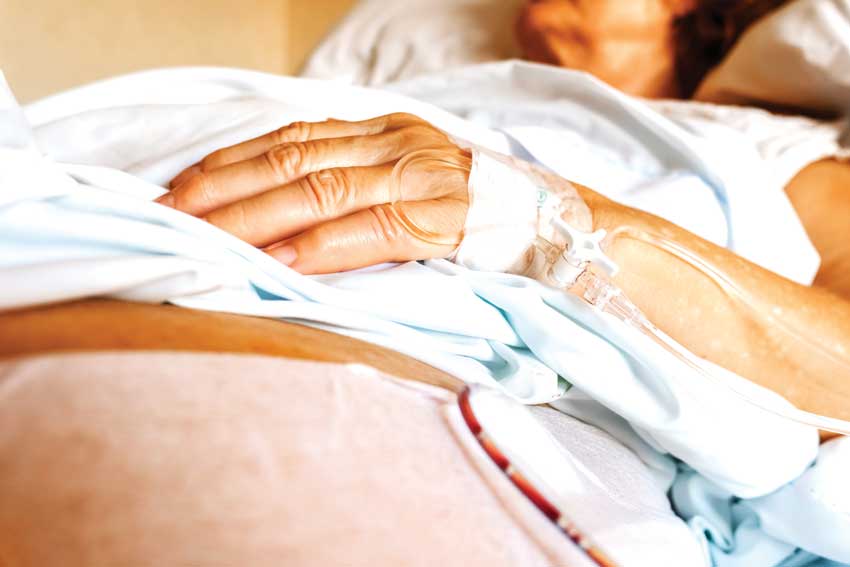
I have been looking after my elderly mother, who has been suffering from cancer for several years. She is still with me at home and is now in considerable discomfort and pain. It is not easy for me. I know of others in the same situation. Do you have any advice for us?
First, at a time when many people are arguing that the solution for your difficult situation is euthanasia, or voluntary assisted dying, it is good to see that you obviously would not think of doing anything to end your mother’s life.
She is your mother. She loves you and you love her; you are showing how much you love her by your sacrifice.
One helpful thought in your situation is to think of how much your mother loved you and sacrificed herself for you when she brought you into the world.
“Christ’s experience resonates with the sick who are often seen as a burden to society; their questions are not understood; they often undergo forms of affective desertion and the loss of connection with others …”
First, there was the pregnancy, when she suffered morning sickness for some months and became increasingly tired and aching as the time drew near for your delivery.
Then came all the pain of labour and childbirth, which only a mother can know. This was followed by feeding you every few hours for months, including throughout the night, so that she suffered from chronic sleep deprivation. And so much more, as you gradually grew from infancy to childhood to adolescence and adulthood.
If she did all this for you when you were young and unaware, you now have an opportunity to return her love and sacrifice by looking after her in her old age and sickness.

Whatever sacrifice you make for her now will be only a small repayment for what she did for you. Your kindness and care will show her that you truly love her, which is what she most wants and needs at this time.
Another thought is to remember that whatever you do for her, you are doing for Jesus Christ himself. He said so, and he promised you an eternal reward for it: “Come, O blessed of my Father, inherit the kingdom prepared for you from the foundation of the world; for I was hungry and you gave me food, I was thirsty and you gave me drink, … I was sick and you visited me… Truly, I say to you, as you did it to one of the least of these my brethren, you did it to me” (Mt 25:34-40).
With these words, Our Lord is telling us that not only you, who are looking after your own mother, but all those who care for others with compassion, regardless of their relationship with them, are doing it to Christ and are storing up for themselves treasure in heaven. This can be a great help to nurses and doctors, to those working in aged care facilities, those looking after the handicapped, the poor and homeless and so many more.
“Come, O blessed of my Father, inherit the kingdom prepared for you from the foundation of the world; for I was hungry and you gave me food, I was thirsty and you gave me drink, … I was sick and you visited me… Truly, I say to you, as you did it to one of the least of these my brethren, you did it to me.”
The Letter Samaritanus bonus of the Vatican’s Congregation for the Doctrine of the Faith on the care of persons in the terminal phase of life, approved by Pope Francis and released on 22 September 2020, has much to tell us in this regard: “Every individual who cares for the sick (physician, nurse, relative, volunteer, pastor) has the moral responsibility to apprehend the fundamental and inalienable good that is the human person… At work here is a contemplative gaze that beholds in one’s own existence and that of others a unique and unrepeatable wonder, received and welcomed as a gift. This is the gaze of the one who does not pretend to take possession of the reality of life but welcomes it as it is, with its difficulties and sufferings, and, guided by faith, finds in illness the readiness to abandon oneself to the Lord of life who is manifest therein” (n. I).
Speaking of Christ’s suffering on the cross, the letter says: “Christ’s experience resonates with the sick who are often seen as a burden to society; their questions are not understood; they often undergo forms of affective desertion and the loss of connection with others… Every sick person has the need not only to be heard, but to understand that their interlocutor ‘knows’ what it means to feel alone, neglected, and tormented by the prospect of physical pain. Added to this is the suffering caused when society equates their value as persons to their quality of life and makes them feel like a burden to others” (n. II).
If everyone treated their loved ones who are dying with this spirit, and with as much love and kindness as you are doing, there would be no great push for euthanasia.
Related Articles:
